Essay on Harsh Corporal Punishment in Malaysian Homes and Solutions
VerifiedAdded on 2022/08/27
|6
|1423
|20
Essay
AI Summary
This essay delves into the issue of harsh corporal punishment within Malaysian homes, examining its prevalence and cultural acceptance. It explores the detrimental effects of such punishment on children, including psychological maladjustment, poor educational outcomes, and the development of aggressive behaviors. The essay highlights the role of authoritarian parenting styles and the legal acceptance of caning in Malaysia. Furthermore, it discusses current measures taken by authorities, such as state intervention and fines, to curb corporal punishment. The essay recommends legislative changes and the establishment of children’s homes as potential solutions to safeguard children. The conclusion emphasizes the need for alternative disciplinary methods to promote children’s well-being and development.
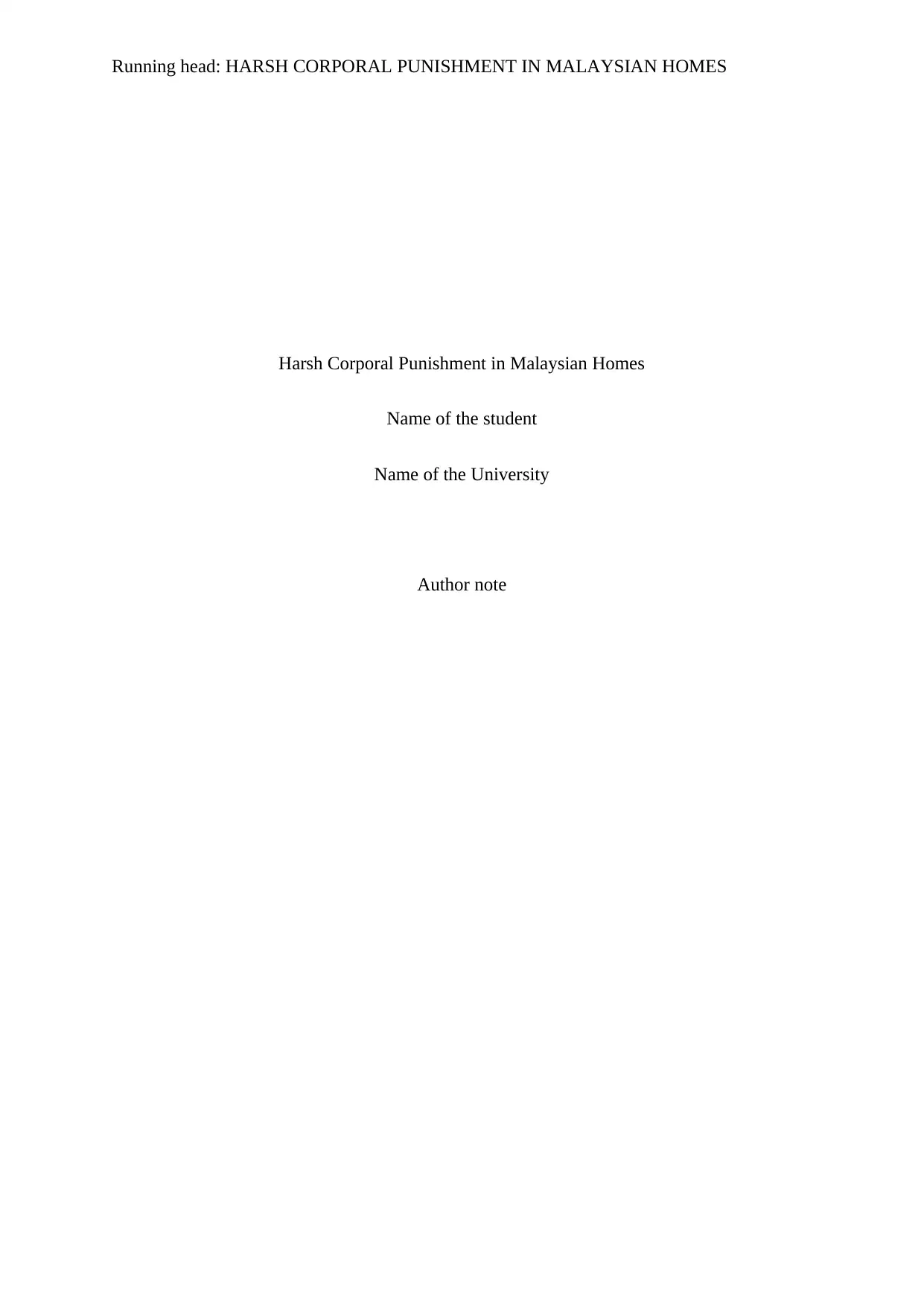
Running head: HARSH CORPORAL PUNISHMENT IN MALAYSIAN HOMES
Harsh Corporal Punishment in Malaysian Homes
Name of the student
Name of the University
Author note
Harsh Corporal Punishment in Malaysian Homes
Name of the student
Name of the University
Author note
Paraphrase This Document
Need a fresh take? Get an instant paraphrase of this document with our AI Paraphraser
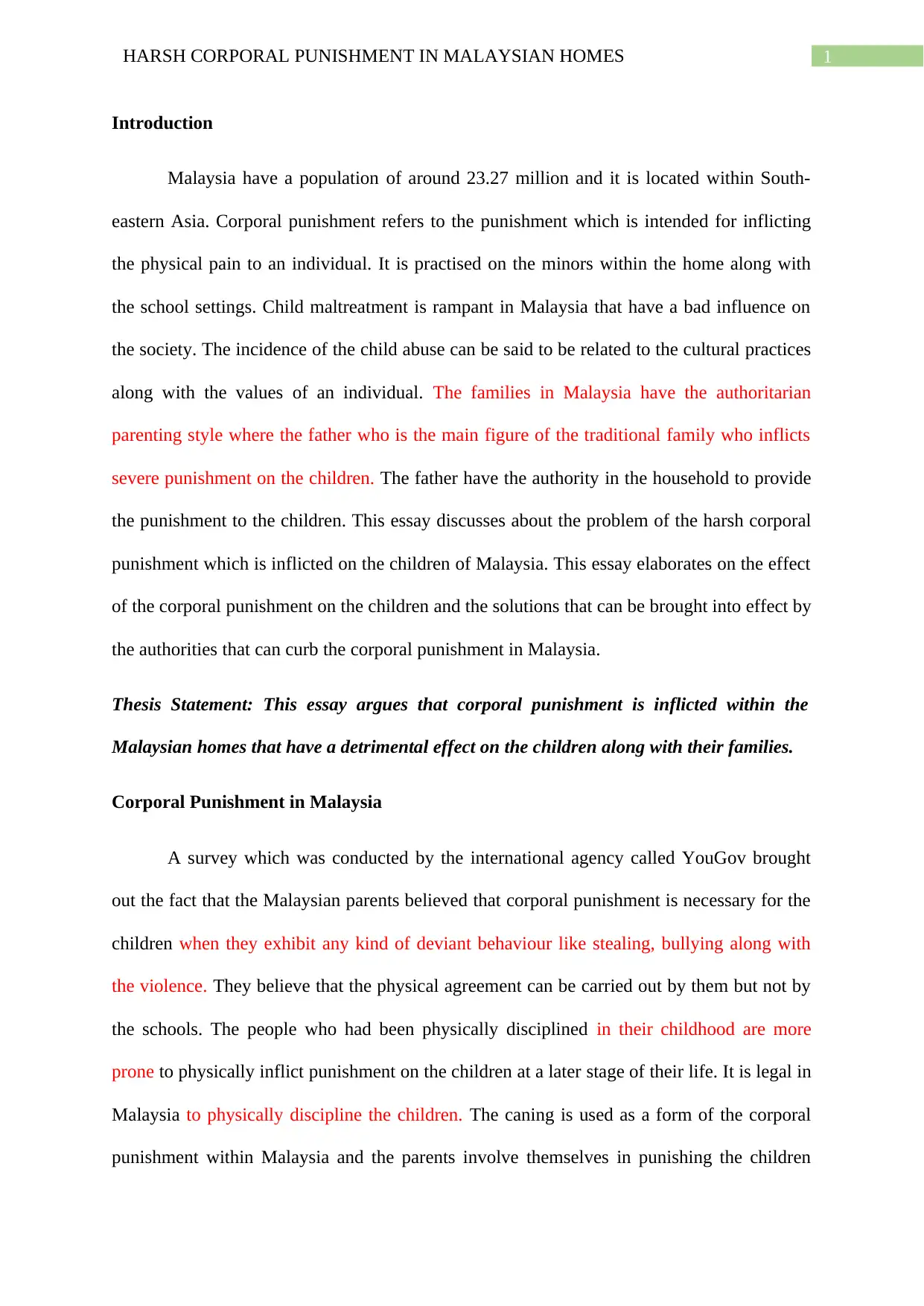
1HARSH CORPORAL PUNISHMENT IN MALAYSIAN HOMES
Introduction
Malaysia have a population of around 23.27 million and it is located within South-
eastern Asia. Corporal punishment refers to the punishment which is intended for inflicting
the physical pain to an individual. It is practised on the minors within the home along with
the school settings. Child maltreatment is rampant in Malaysia that have a bad influence on
the society. The incidence of the child abuse can be said to be related to the cultural practices
along with the values of an individual. The families in Malaysia have the authoritarian
parenting style where the father who is the main figure of the traditional family who inflicts
severe punishment on the children. The father have the authority in the household to provide
the punishment to the children. This essay discusses about the problem of the harsh corporal
punishment which is inflicted on the children of Malaysia. This essay elaborates on the effect
of the corporal punishment on the children and the solutions that can be brought into effect by
the authorities that can curb the corporal punishment in Malaysia.
Thesis Statement: This essay argues that corporal punishment is inflicted within the
Malaysian homes that have a detrimental effect on the children along with their families.
Corporal Punishment in Malaysia
A survey which was conducted by the international agency called YouGov brought
out the fact that the Malaysian parents believed that corporal punishment is necessary for the
children when they exhibit any kind of deviant behaviour like stealing, bullying along with
the violence. They believe that the physical agreement can be carried out by them but not by
the schools. The people who had been physically disciplined in their childhood are more
prone to physically inflict punishment on the children at a later stage of their life. It is legal in
Malaysia to physically discipline the children. The caning is used as a form of the corporal
punishment within Malaysia and the parents involve themselves in punishing the children
Introduction
Malaysia have a population of around 23.27 million and it is located within South-
eastern Asia. Corporal punishment refers to the punishment which is intended for inflicting
the physical pain to an individual. It is practised on the minors within the home along with
the school settings. Child maltreatment is rampant in Malaysia that have a bad influence on
the society. The incidence of the child abuse can be said to be related to the cultural practices
along with the values of an individual. The families in Malaysia have the authoritarian
parenting style where the father who is the main figure of the traditional family who inflicts
severe punishment on the children. The father have the authority in the household to provide
the punishment to the children. This essay discusses about the problem of the harsh corporal
punishment which is inflicted on the children of Malaysia. This essay elaborates on the effect
of the corporal punishment on the children and the solutions that can be brought into effect by
the authorities that can curb the corporal punishment in Malaysia.
Thesis Statement: This essay argues that corporal punishment is inflicted within the
Malaysian homes that have a detrimental effect on the children along with their families.
Corporal Punishment in Malaysia
A survey which was conducted by the international agency called YouGov brought
out the fact that the Malaysian parents believed that corporal punishment is necessary for the
children when they exhibit any kind of deviant behaviour like stealing, bullying along with
the violence. They believe that the physical agreement can be carried out by them but not by
the schools. The people who had been physically disciplined in their childhood are more
prone to physically inflict punishment on the children at a later stage of their life. It is legal in
Malaysia to physically discipline the children. The caning is used as a form of the corporal
punishment within Malaysia and the parents involve themselves in punishing the children
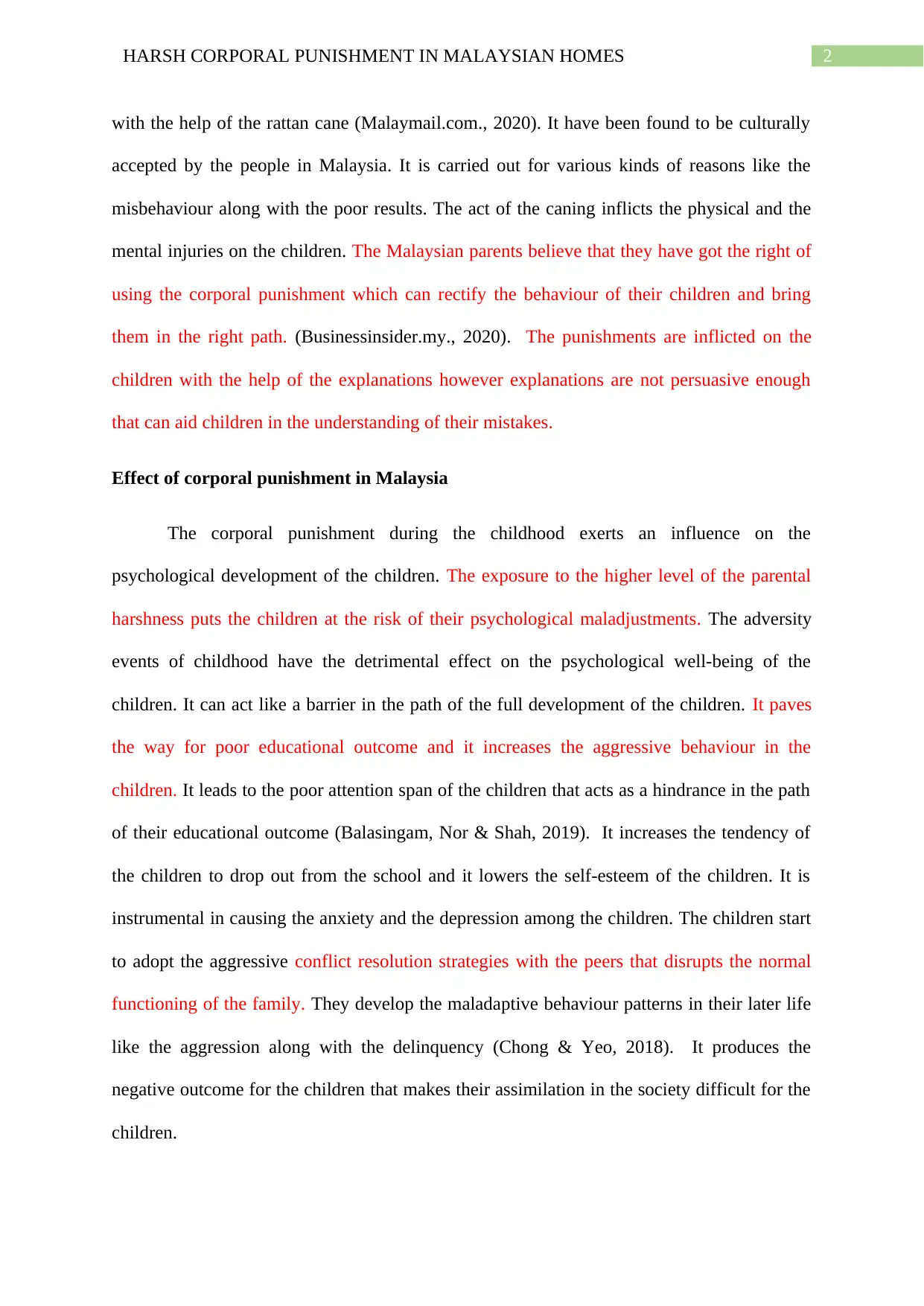
2HARSH CORPORAL PUNISHMENT IN MALAYSIAN HOMES
with the help of the rattan cane (Malaymail.com., 2020). It have been found to be culturally
accepted by the people in Malaysia. It is carried out for various kinds of reasons like the
misbehaviour along with the poor results. The act of the caning inflicts the physical and the
mental injuries on the children. The Malaysian parents believe that they have got the right of
using the corporal punishment which can rectify the behaviour of their children and bring
them in the right path. (Businessinsider.my., 2020). The punishments are inflicted on the
children with the help of the explanations however explanations are not persuasive enough
that can aid children in the understanding of their mistakes.
Effect of corporal punishment in Malaysia
The corporal punishment during the childhood exerts an influence on the
psychological development of the children. The exposure to the higher level of the parental
harshness puts the children at the risk of their psychological maladjustments. The adversity
events of childhood have the detrimental effect on the psychological well-being of the
children. It can act like a barrier in the path of the full development of the children. It paves
the way for poor educational outcome and it increases the aggressive behaviour in the
children. It leads to the poor attention span of the children that acts as a hindrance in the path
of their educational outcome (Balasingam, Nor & Shah, 2019). It increases the tendency of
the children to drop out from the school and it lowers the self-esteem of the children. It is
instrumental in causing the anxiety and the depression among the children. The children start
to adopt the aggressive conflict resolution strategies with the peers that disrupts the normal
functioning of the family. They develop the maladaptive behaviour patterns in their later life
like the aggression along with the delinquency (Chong & Yeo, 2018). It produces the
negative outcome for the children that makes their assimilation in the society difficult for the
children.
with the help of the rattan cane (Malaymail.com., 2020). It have been found to be culturally
accepted by the people in Malaysia. It is carried out for various kinds of reasons like the
misbehaviour along with the poor results. The act of the caning inflicts the physical and the
mental injuries on the children. The Malaysian parents believe that they have got the right of
using the corporal punishment which can rectify the behaviour of their children and bring
them in the right path. (Businessinsider.my., 2020). The punishments are inflicted on the
children with the help of the explanations however explanations are not persuasive enough
that can aid children in the understanding of their mistakes.
Effect of corporal punishment in Malaysia
The corporal punishment during the childhood exerts an influence on the
psychological development of the children. The exposure to the higher level of the parental
harshness puts the children at the risk of their psychological maladjustments. The adversity
events of childhood have the detrimental effect on the psychological well-being of the
children. It can act like a barrier in the path of the full development of the children. It paves
the way for poor educational outcome and it increases the aggressive behaviour in the
children. It leads to the poor attention span of the children that acts as a hindrance in the path
of their educational outcome (Balasingam, Nor & Shah, 2019). It increases the tendency of
the children to drop out from the school and it lowers the self-esteem of the children. It is
instrumental in causing the anxiety and the depression among the children. The children start
to adopt the aggressive conflict resolution strategies with the peers that disrupts the normal
functioning of the family. They develop the maladaptive behaviour patterns in their later life
like the aggression along with the delinquency (Chong & Yeo, 2018). It produces the
negative outcome for the children that makes their assimilation in the society difficult for the
children.
⊘ This is a preview!⊘
Do you want full access?
Subscribe today to unlock all pages.

Trusted by 1+ million students worldwide
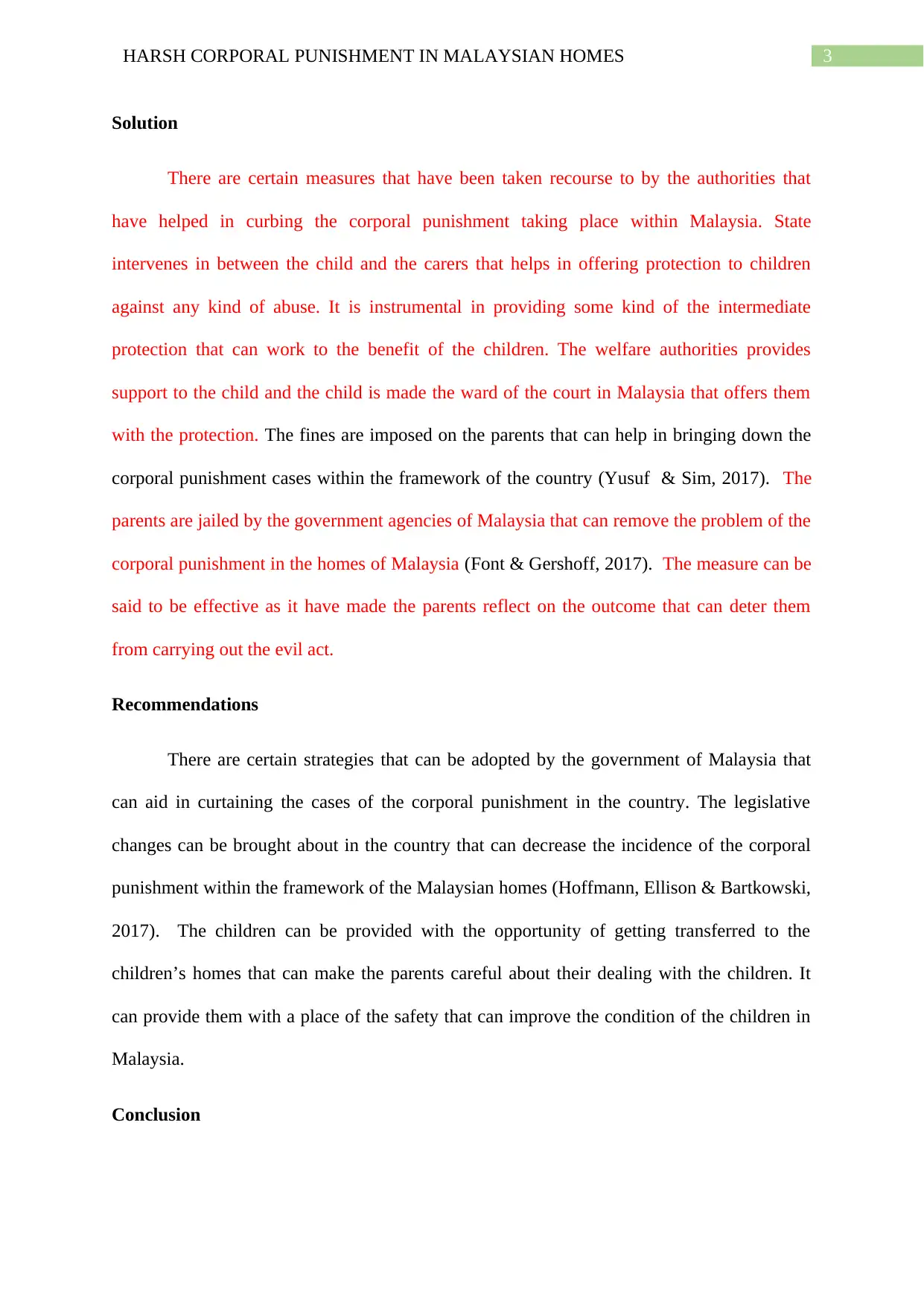
3HARSH CORPORAL PUNISHMENT IN MALAYSIAN HOMES
Solution
There are certain measures that have been taken recourse to by the authorities that
have helped in curbing the corporal punishment taking place within Malaysia. State
intervenes in between the child and the carers that helps in offering protection to children
against any kind of abuse. It is instrumental in providing some kind of the intermediate
protection that can work to the benefit of the children. The welfare authorities provides
support to the child and the child is made the ward of the court in Malaysia that offers them
with the protection. The fines are imposed on the parents that can help in bringing down the
corporal punishment cases within the framework of the country (Yusuf & Sim, 2017). The
parents are jailed by the government agencies of Malaysia that can remove the problem of the
corporal punishment in the homes of Malaysia (Font & Gershoff, 2017). The measure can be
said to be effective as it have made the parents reflect on the outcome that can deter them
from carrying out the evil act.
Recommendations
There are certain strategies that can be adopted by the government of Malaysia that
can aid in curtaining the cases of the corporal punishment in the country. The legislative
changes can be brought about in the country that can decrease the incidence of the corporal
punishment within the framework of the Malaysian homes (Hoffmann, Ellison & Bartkowski,
2017). The children can be provided with the opportunity of getting transferred to the
children’s homes that can make the parents careful about their dealing with the children. It
can provide them with a place of the safety that can improve the condition of the children in
Malaysia.
Conclusion
Solution
There are certain measures that have been taken recourse to by the authorities that
have helped in curbing the corporal punishment taking place within Malaysia. State
intervenes in between the child and the carers that helps in offering protection to children
against any kind of abuse. It is instrumental in providing some kind of the intermediate
protection that can work to the benefit of the children. The welfare authorities provides
support to the child and the child is made the ward of the court in Malaysia that offers them
with the protection. The fines are imposed on the parents that can help in bringing down the
corporal punishment cases within the framework of the country (Yusuf & Sim, 2017). The
parents are jailed by the government agencies of Malaysia that can remove the problem of the
corporal punishment in the homes of Malaysia (Font & Gershoff, 2017). The measure can be
said to be effective as it have made the parents reflect on the outcome that can deter them
from carrying out the evil act.
Recommendations
There are certain strategies that can be adopted by the government of Malaysia that
can aid in curtaining the cases of the corporal punishment in the country. The legislative
changes can be brought about in the country that can decrease the incidence of the corporal
punishment within the framework of the Malaysian homes (Hoffmann, Ellison & Bartkowski,
2017). The children can be provided with the opportunity of getting transferred to the
children’s homes that can make the parents careful about their dealing with the children. It
can provide them with a place of the safety that can improve the condition of the children in
Malaysia.
Conclusion
Paraphrase This Document
Need a fresh take? Get an instant paraphrase of this document with our AI Paraphraser
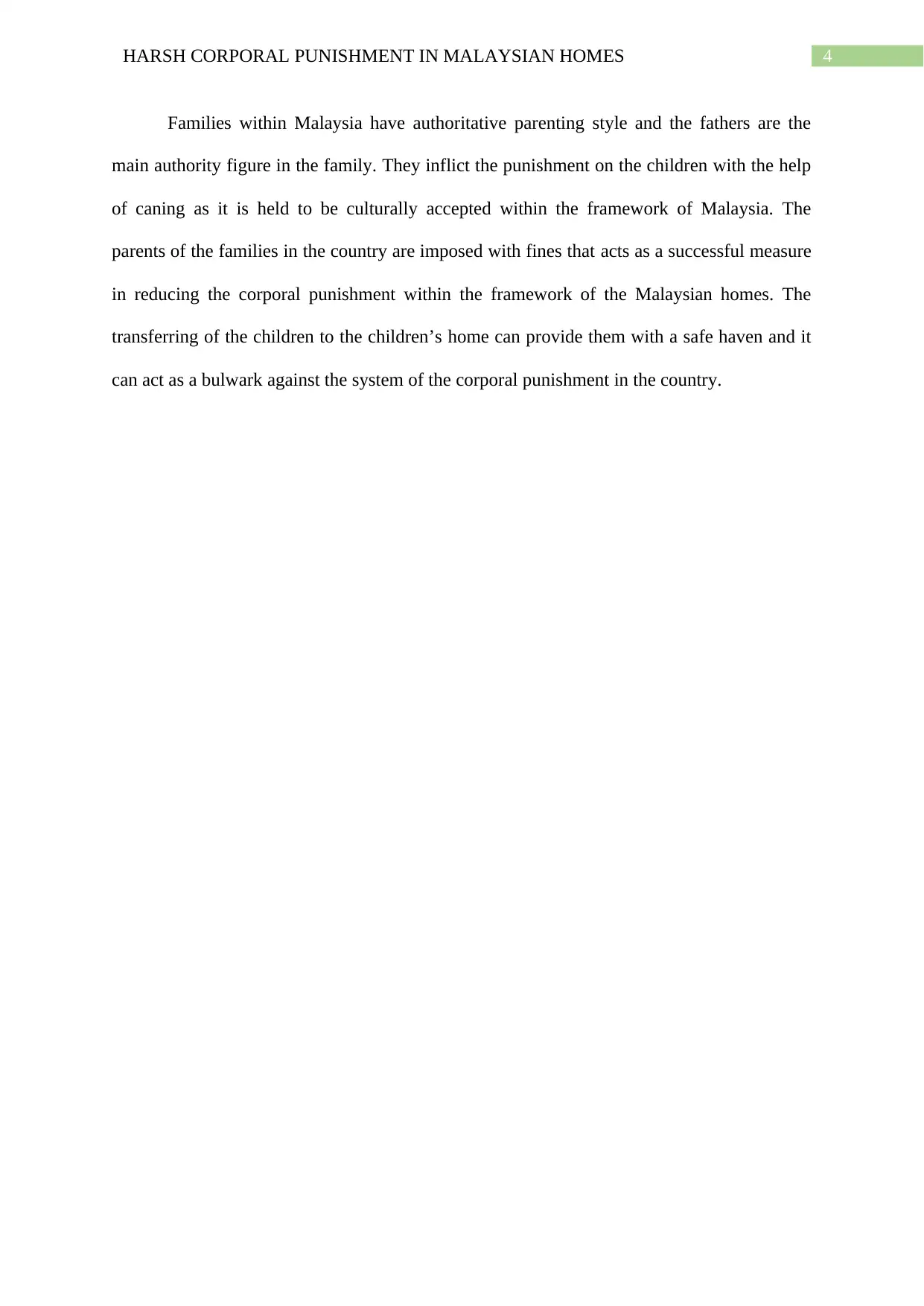
4HARSH CORPORAL PUNISHMENT IN MALAYSIAN HOMES
Families within Malaysia have authoritative parenting style and the fathers are the
main authority figure in the family. They inflict the punishment on the children with the help
of caning as it is held to be culturally accepted within the framework of Malaysia. The
parents of the families in the country are imposed with fines that acts as a successful measure
in reducing the corporal punishment within the framework of the Malaysian homes. The
transferring of the children to the children’s home can provide them with a safe haven and it
can act as a bulwark against the system of the corporal punishment in the country.
Families within Malaysia have authoritative parenting style and the fathers are the
main authority figure in the family. They inflict the punishment on the children with the help
of caning as it is held to be culturally accepted within the framework of Malaysia. The
parents of the families in the country are imposed with fines that acts as a successful measure
in reducing the corporal punishment within the framework of the Malaysian homes. The
transferring of the children to the children’s home can provide them with a safe haven and it
can act as a bulwark against the system of the corporal punishment in the country.
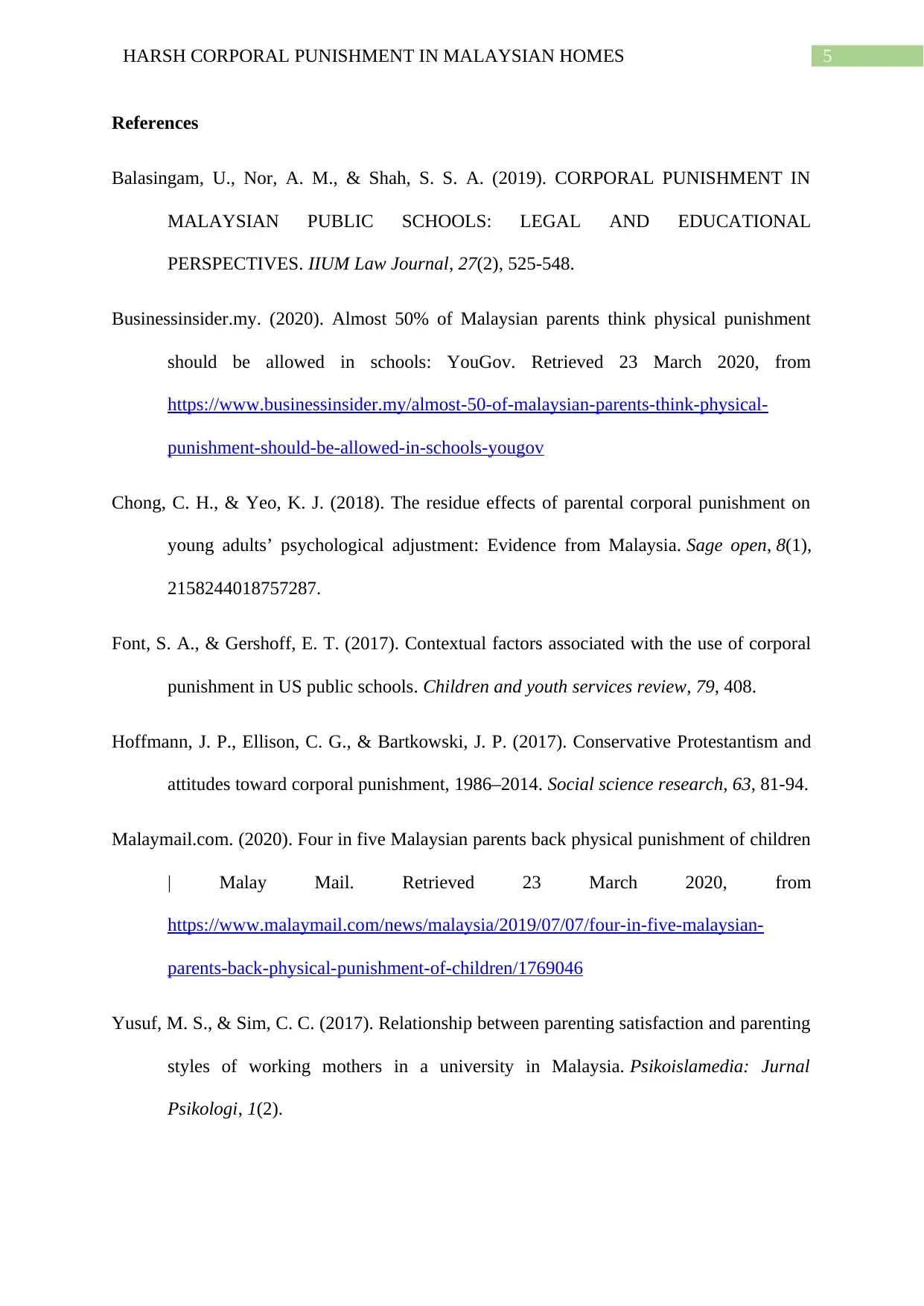
5HARSH CORPORAL PUNISHMENT IN MALAYSIAN HOMES
References
Balasingam, U., Nor, A. M., & Shah, S. S. A. (2019). CORPORAL PUNISHMENT IN
MALAYSIAN PUBLIC SCHOOLS: LEGAL AND EDUCATIONAL
PERSPECTIVES. IIUM Law Journal, 27(2), 525-548.
Businessinsider.my. (2020). Almost 50% of Malaysian parents think physical punishment
should be allowed in schools: YouGov. Retrieved 23 March 2020, from
https://www.businessinsider.my/almost-50-of-malaysian-parents-think-physical-
punishment-should-be-allowed-in-schools-yougov
Chong, C. H., & Yeo, K. J. (2018). The residue effects of parental corporal punishment on
young adults’ psychological adjustment: Evidence from Malaysia. Sage open, 8(1),
2158244018757287.
Font, S. A., & Gershoff, E. T. (2017). Contextual factors associated with the use of corporal
punishment in US public schools. Children and youth services review, 79, 408.
Hoffmann, J. P., Ellison, C. G., & Bartkowski, J. P. (2017). Conservative Protestantism and
attitudes toward corporal punishment, 1986–2014. Social science research, 63, 81-94.
Malaymail.com. (2020). Four in five Malaysian parents back physical punishment of children
| Malay Mail. Retrieved 23 March 2020, from
https://www.malaymail.com/news/malaysia/2019/07/07/four-in-five-malaysian-
parents-back-physical-punishment-of-children/1769046
Yusuf, M. S., & Sim, C. C. (2017). Relationship between parenting satisfaction and parenting
styles of working mothers in a university in Malaysia. Psikoislamedia: Jurnal
Psikologi, 1(2).
References
Balasingam, U., Nor, A. M., & Shah, S. S. A. (2019). CORPORAL PUNISHMENT IN
MALAYSIAN PUBLIC SCHOOLS: LEGAL AND EDUCATIONAL
PERSPECTIVES. IIUM Law Journal, 27(2), 525-548.
Businessinsider.my. (2020). Almost 50% of Malaysian parents think physical punishment
should be allowed in schools: YouGov. Retrieved 23 March 2020, from
https://www.businessinsider.my/almost-50-of-malaysian-parents-think-physical-
punishment-should-be-allowed-in-schools-yougov
Chong, C. H., & Yeo, K. J. (2018). The residue effects of parental corporal punishment on
young adults’ psychological adjustment: Evidence from Malaysia. Sage open, 8(1),
2158244018757287.
Font, S. A., & Gershoff, E. T. (2017). Contextual factors associated with the use of corporal
punishment in US public schools. Children and youth services review, 79, 408.
Hoffmann, J. P., Ellison, C. G., & Bartkowski, J. P. (2017). Conservative Protestantism and
attitudes toward corporal punishment, 1986–2014. Social science research, 63, 81-94.
Malaymail.com. (2020). Four in five Malaysian parents back physical punishment of children
| Malay Mail. Retrieved 23 March 2020, from
https://www.malaymail.com/news/malaysia/2019/07/07/four-in-five-malaysian-
parents-back-physical-punishment-of-children/1769046
Yusuf, M. S., & Sim, C. C. (2017). Relationship between parenting satisfaction and parenting
styles of working mothers in a university in Malaysia. Psikoislamedia: Jurnal
Psikologi, 1(2).
⊘ This is a preview!⊘
Do you want full access?
Subscribe today to unlock all pages.

Trusted by 1+ million students worldwide
1 out of 6
Related Documents
Your All-in-One AI-Powered Toolkit for Academic Success.
+13062052269
info@desklib.com
Available 24*7 on WhatsApp / Email
![[object Object]](/_next/static/media/star-bottom.7253800d.svg)
Unlock your academic potential
Copyright © 2020–2025 A2Z Services. All Rights Reserved. Developed and managed by ZUCOL.





